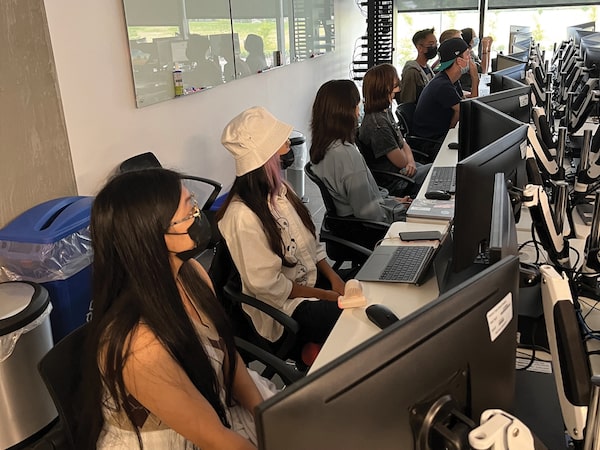
The Pembina Trails Early College program, which allows students to attain both their high school diploma and a post-secondary credential, attracts a diverse student body.SUPPLIED
Picture a four-year program where high school students acquire a college credential in a highly in-demand IT field. In addition, they connect with industry experts to learn about work experiences, work with mentors in small teams to advance project management skills, receive guidance on career readiness, and gain hands-on work experience through internships. Now imagine all this happening during the years when students complete their high school diploma.
“I have seen the interest in technology increase substantially during the past five years PTEC has been open. Students are coming already equipped with coding and high-level technology skills year over year,” says Jane Bachart, principal of the Pembina Trails Early College (PTEC) program, a unique dual-credit program delivered by the Pembina Trails School Division, the Manitoba Institute of Trades and Technology (MITT) and Tech Manitoba (TechMB).
The program attracts more applicants than can be accommodated, Ms. Bachart notes. “We have space for 32 participants per year. For the past few years, we’ve had over 100 students on the waiting list.”
PTEC allows students to attain both their high school diploma and a post-secondary credential in either software development or network and systems administration, where training is delivered at MITT, says Neil Cooke, the institute’s vice-president of Academic. “This gives participants a glimpse of what to expect in the post-secondary world and provides a pathway to either entering the IT industry or working towards further education.”
MITT’s robust and modern IT lab infrastructure, with up-to-date equipment and private cloud, allows students to practise hands-on, real-life scenarios on campus or online. What’s more, industry feedback ensures that all curriculum content at the institute is regularly updated to reflect current trends – and needs – of employers, says Mr. Cooke. “This means students leave with the knowledge, skills and credentials that are sought after by companies.”
PTEC graduates acquire unique competencies that include up-to-date technical knowledge as well as strong interpersonal skills, says Mr. Cooke. “Our industry partners repeatedly tell us how impressed they are with these young people who check all the boxes of what employers look for.”
When presented with opportunities to demonstrate their skills, for example, in competitions like Skills Manitoba, PTEC students often outperform competitors who are college and university graduates, he says. “Their analytical skills, diagnostic abilities and emotional intelligence are impressive, making them sought-after candidates for companies that include world-leading gaming, technology development and cybersecurity firms.”
Part of what makes this model so effective is a “holistic approach to technology,” where personal development is prioritized alongside technical skills, emphasizes Ms. Bachart. “We talk about a student’s digital footprint, being a digital citizen and our job as a global citizen. We try to ensure that our students understand the power of the knowledge that they have acquired and make good ethical decisions based on that.”
Pembina Trails School Division is always open to sharing its success and programming to support growth throughout Manitoba and Canada.
“We know how to do it, and we know how to do it well,” she says. “[Digital literacy] skills are essential in 2023 and beyond, not only for those pursuing a technology career but also for all other industries that require these specialists and their 21st century skills and education.”
Advertising feature produced by Randall Anthony Communications with Colleges and Institutes Canada. The Globe’s editorial department was not involved.